Steroids
Thyroid Hormones For Fat Loss In Women

Thyroid hormones play a significant role in regulating metabolism and can impact body weight and fat loss. However, using thyroid hormones for fat loss in women or anyone else should only be done under the guidance and supervision of a qualified healthcare professional. Self-administering thyroid hormones can have serious health risks and is not a safe or effective way to lose weight.
Here are some important things you need to know about thyroid hormones:
Thyroid Function
The thyroid gland produces two primary hormones, thyroxine (T4) and triiodothyronine (T3), which are key in regulating metabolism. When there is an imbalance in these hormones, it can affect metabolism and potentially lead to weight gain or difficulty losing weight.
Hypothyroidism
Hypothyroidism is when the thyroid gland produces insufficient thyroid hormones. Symptoms can include weight gain, fatigue, and difficulty losing weight. In such cases, healthcare professionals may prescribe synthetic thyroid hormone replacement therapy, such as levothyroxine, to restore normal thyroid function.
Hyperthyroidism
Hyperthyroidism is when the thyroid gland produces an excess of thyroid hormones. This can lead to weight loss, increased metabolism, and other symptoms. Identifying and treating the underlying cause of hyperthyroidism is essential, as simply using thyroid hormones for weight loss can be dangerous.
Risks of Self-Medication
Self-administering thyroid hormones can be dangerous in treating hypothyroidism or for weight loss purposes. It can lead to serious health complications, including heart problems, bone loss, and other adverse effects.
Individual Variation
People's responses to thyroid hormones can vary widely. What works for one person may not work for another, and improper use can lead to health problems.
Healthy Lifestyle
A balanced diet and regular exercise is the most effective and safe way to lose fat and maintain a healthy weight. A healthcare professional can guide a personalized weight loss plan.
Consult a Healthcare Professional
If you suspect you have a thyroid disorder or are struggling with weight issues, it's essential to consult a healthcare professional for proper evaluation and guidance. They can diagnose any thyroid conditions and recommend appropriate treatments if necessary.
Real Life Scenario
A 40-year-old woman claimed to be active in the sport. She started to join swimming competitions when she was a kid and eats healthily on organic foods. She, however, admitted her big appetite for eating after training is helpless. Also, she never really counts calories, but fortunately, with the sports she does, she never has an issue with weight or body fat. As years pass, she can’t keep off the fat and took T4 wrongly. The overdose of T4 has led her to bulk. The heart rate began to increase, but the fat loss program was effective, although it caused more trouble.
Then she tried T3, but this time, with a proper 100 mcg/day dosage. However, another problem occurred as the heart rate affected her training, and the fat loss program was no longer effective. She supported her training with fat loss supplements, including thyroid hormone.
But another question comes to mind: is it effective? And what about the difference between T3 and T4?
This woman’s case is a genetically gifted one. She can stay slim while having a big appetite. Not everyone can maintain a lean body while eating a lot and rely only on training. At the age of 40, the case is different. Our body will experience a certain degradation, and getting back a lean body might not be easy, like when you are 20. Hence, calories are the things to avoid if you want to lose fat.
on training. At the age of 40, the case is different. Our body will experience a certain degradation, and getting back a lean body might not be easy, like when you are 20. Hence, calories are the things to avoid if you want to lose fat.
Fat Loss Supplements:
Fat loss supplements may be effective for some people. It reduces your appetite released by the chemical substance in the supplement. In return, it raises the metabolic rate and the process. This significant loss of appetite causes an individual to eat less – and lose fat. The supplement products generally work like this.
Must Read: Supplements for Gaining Mass and Those For Muscle Definition
-
The T3 Effect
When you take T3, your food must ‘work’ to match the calorie-burning rate. This way, you don’t lose fat.
-
The T4 Effect
T4 is rather extreme or stronger than T3. And you will have fat loss.
Thyroid Hormones: Don’t Overdose it
It is important to note that thyroid hormones must not be abused. Once you overdose, it is hard to recover. The powder is not recommended; however, if an individual needs to take it, it must be in a very small dose and prescribed by a nutritionist if possible because there must be an exact 100% certainty.
Some women have been reportedly gaining weight, which is a noticeable sign that they have overdosed on the thyroid. Even when they have struggled, they can’t figure out why. The wrong dosage causes thyroid impairment, slowing down your rate.
The Recommended Intake of Thyroid Hormone:
A healthcare professional should determine the dosage of thyroid hormones (T3 and T4) for women looking to lose weight or manage their thyroid condition based on individual needs and medical history. Self-administering thyroid hormones for weight loss without proper medical guidance can be dangerous and unnecessary.
Here are some tips on T3 and T4 and their roles in thyroid function and metabolism:
- T4 (Thyroxine): T4 is the primary hormone produced by the thyroid gland. It is relatively inactive but is converted into the more active T3 in various body tissues, including the liver. T4 medications are commonly prescribed for hypothyroidism (underactive thyroid).
- T3 (Triiodothyronine): T3 is the more biologically active form of thyroid hormone. It plays a crucial role in regulating metabolism and energy production. In some cases, healthcare providers may prescribe T3 medication (liothyronine) in addition to or instead of T4 for certain thyroid conditions.
When it comes to weight management:
- Hypothyroidism: If a woman has been diagnosed with hypothyroidism, she may be prescribed T4 (levothyroxine) medication to restore thyroid hormone levels to normal. The goal of treatment is to alleviate symptoms of hypothyroidism, such as fatigue, weight gain, and cold intolerance, rather than using thyroid medication solely for weight loss.
- Weight Loss and Thyroid Medication: Using thyroid hormones, whether T3 or T4, as a weight loss tool, is not recommended and can be dangerous. Inappropriate use of thyroid hormones can lead to hyperthyroidism, which can have serious health consequences, including heart problems and bone loss.
It's important to emphasize that thyroid medication should only be prescribed and adjusted by a healthcare provider based on thyroid function tests, medical history, and symptoms. If you suspect you have a thyroid issue or are experiencing difficulty with weight management, consult a healthcare professional for a proper evaluation and treatment plan. They will consider the appropriate T3 and/or T4 dosage based on your specific needs and monitor your progress to ensure safety and effectiveness.
What Are the Appropriate Dosages?
Here are some general guidelines for dosages, but it's essential to follow your healthcare provider's recommendations, as they will determine the appropriate dosage based on your weight needs:
-
Levothyroxine (T4):
- For hypothyroidism: The typical starting dose for adults is 25-50 micrograms (mcg) per day, with adjustments made based on blood tests and symptoms. The goal is to reach a stable TSH (Thyroid-Stimulating Hormone) level within the normal range.
- Maintenance dose: The average maintenance dose for most adults with hypothyroidism ranges from 75 to 150 mcg per day, although it can be higher or lower depending on the individual.
-
Liothyronine (T3):
- T3 is not typically used as a standalone treatment for hypothyroidism but is sometimes prescribed with T4 medications when necessary.
- When used in combination therapy with T4, a common ratio is 1 part T3 to 4 parts T4 (e.g., 5 mcg T3 with 20 mcg T4). The specific dosages should be determined by your healthcare provider based on your condition and response to treatment.
-
Hyperthyroidism:
In cases of hyperthyroidism, the goal is typically to reduce thyroid hormone levels. Your healthcare provider would determine the dosages of antithyroid medications (such as Methimazole or Propylthiouracil) and adjust based on your thyroid hormone levels.
Caution!
It's crucial to take thyroid medications exactly as prescribed and to follow up with your healthcare provider for regular blood tests and monitoring. Thyroid hormone replacement therapy is highly individualized, and the correct dosage can vary widely from person to person.
Additionally, certain factors can affect the absorption of thyroid medications, such as other medications, dietary habits, and gastrointestinal conditions. Therefore, you must inform your healthcare provider about any other medications or supplements you are taking and any changes in your health status.
Never adjust your thyroid medication dosage without consulting your healthcare provider, as improper dosing can lead to adverse effects or inadequate treatment of thyroid disorders. Always seek guidance from a qualified medical professional. In summary:
- The best dosage is less than 50 mcg/day for T3. You need to divide it into 3 doses.
- The best dosage of T4 is less than 200 mcg/day.
T4 vs T3:
T4 has a longer effect when used than T3. Hence, it is preferable to take T4. However, for some individuals, T3 is proven to be more effective. People find that T3 is more convenient in terms of conversion.
Thyroid Affects Most Women:
There are many reasons why women have thyroid issues, and here are some of the factors
- Pregnancy
- PMS
- And per menopause
The calorie intake must be well monitored. The dose of thyroid hormone needs to be a certain number allowed because it will affect the metabolic rate.
MUST READ: Best Anabolic Steroids For Women
Overall
In summary, thyroid hormones are essential for regulating metabolism. They can influence body weight, but using them for fat loss should only be done under medical supervision when diagnosed with a thyroid disorder. Self-medication or misuse of thyroid hormones for weight loss is unsafe and not recommended. A holistic approach to weight management, including diet and exercise, should be the first defense in achieving and maintaining a healthy weight.
Steroids
Decoding IGF-1 LR3: A Guide to its Benefits

IGF-1 LR3 (Insulin-like Growth Factor-1 Long Arg3) is a synthetic variant of IGF-1, a hormone produced by the liver in response to growth hormone (GH). Unlike GH, which works indirectly, IGF-1 directly facilitates the growth and repair of muscle cells.
Related Article: Ostarine for Beginners; The Ultimate Guide
This modified version of IGF-1 is engineered to avoid binding with IGF-binding proteins, extending its half-life to 20–30 hours. As a result, it remains active in the body significantly longer than natural IGF-1.
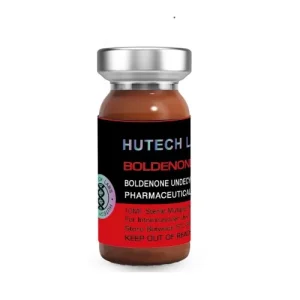 Click here to BuyBoldenone 300 by Hutech
Click here to BuyBoldenone 300 by Hutech
Many performance athletes incorporate IGF-1 LR3 post-workout to enhance muscle growth, speed up recovery, and support fat loss. When injected into specific muscle groups, it often produces localized effects. Additionally, it helps with nutrient distribution and, in some cases, improves insulin sensitivity.
On the other hand, human growth hormone (HGH) operates more broadly and indirectly, stimulating the liver to produce IGF-1 and offering more systemic benefits such as improved skin health, joint support, and fat reduction, albeit at a slower pace.
Typical IGF-1 LR3 doses range from 20–50 mcg daily, administered subcutaneously or intramuscularly, often following a workout.
Key Features of IGF-1 LR3
Enhanced Bioavailability: It avoids binding with IGF-binding proteins, increasing its potency.
Muscle Growth & Repair: Directly stimulates muscle cell proliferation and differentiation.
Improved Nutrient Distribution: Helps shuttle nutrients into muscle cells, supporting recovery.
Potential Fat Loss Benefits: Some users report improved insulin sensitivity and fat metabolism.
Mechanism of Action
IGF-1 LR3 interacts with IGF-1 receptors on muscle cells, activating pathways like PI3K-AKT and MAPK, which are crucial for cell growth and regeneration. This makes it a powerful tool for bodybuilders and athletes looking to optimize recovery and muscle development.
What Are the Top 10 Alternatives to IGF-1 LR3?
Here are some of the top alternatives to IGF-1 LR3, each with unique benefits for muscle growth, recovery, and performance:
BPC-157 – Known for its regenerative properties, it enhances healing and tissue repair.
CJC-1295 – A growth hormone-releasing peptide that boosts GH levels for muscle development.
Ipamorelin – Stimulates GH release with minimal side effects, making it a safer option.
MK-677 (Ibutamoren) – A potent GH secretagogue that promotes muscle growth and fat loss.
Sermorelin – Encourages natural GH production, supporting recovery and lean muscle gains.
Tesamorelin – Primarily used for fat loss, but also aids in muscle preservation.
Follistatin-344 – Inhibits myostatin, allowing for increased muscle hypertrophy.
PEG-MGF (Pegylated Mechano Growth Factor) – Enhances muscle repair and growth post-exercise.
GHRP-6 – Stimulates appetite and GH release, supporting muscle mass gains.
GHRP-2 – Similar to GHRP-6 but with fewer hunger-related side effects.
Each of these peptides has distinct mechanisms and benefits.
Must Read: Are Nootropics a Better Option to AAS?
Potential Risks Associated With IGF-1 LR3
IGF-1 LR3 comes with several potential risks, especially for bodybuilders using it to enhance muscle growth. Here are some key concerns:
Hypoglycemia (Low Blood Sugar) – IGF-1 LR3 increases glucose uptake in muscle cells, which can lead to dangerously low blood sugar levels if not managed properly.
Organ Growth – Since IGF-1 affects all tissues, excessive use may lead to unwanted growth in organs, increasing health risks.
Cancer Risk – IGF-1 plays a role in cell proliferation, and elevated levels have been linked to an increased risk of certain cancers.
Water Retention & Edema – Some users experience bloating and fluid retention, which can affect performance and aesthetics.
Joint Pain & Stiffness – Excessive IGF-1 levels may contribute to joint discomfort due to increased tissue growth.
Cardiovascular Issues – There is some concern that IGF-1 LR3 could contribute to heart enlargement or other cardiovascular complications.
Desensitization – Long-term use may reduce the body's natural IGF-1 production, leading to dependency
Overall
IGF-1 LR3's ability to bypass IGF-binding proteins makes it more potent but also increases the likelihood of desensitization with prolonged use. For those considering it, careful dosing and monitoring are crucial to mitigate side effects.
Steroids
AOD-9604: The Fat-Burning Peptide Explained

AOD-9604, along with the similar HGH Frag 176-191, is a peptide derived from Growth Hormone that includes only the amino acids in HGH responsible for stimulating fat breakdown, known as lipolysis.
This means that these peptides offer the fat-burning benefits of HGH without its other effects—whether beneficial or adverse—and come at a lower cost.
Related Article: Anavar Cycle for Men and Women
Lipolysis refers to the process where fat cells are broken down to be utilized as energy. AOD-9604 promotes accelerated fat loss by increasing the body's use of fat as fuel.
For optimal results, the peptides should be used in a fasted state. AOD-9604 and Frag 176-191 are most effective when administered at a dose of 125-250mcg before bedtime (at least 3-4 hours after eating) and in the morning at the same dose, followed by a fasting period of 3-4 hours, ideally combined with fasted cardio.
Check Out Dragontropin HGH 100 IU by Dragon Pharma
Similar Peptides with Fat-Burning Effect
Here’s a list of 10 peptides similar to AOD-9604, each with a brief description:
Ipamorelin: A growth hormone-releasing peptide (GHRP) that stimulates the natural release of growth hormone, promoting fat loss, muscle growth, and improved recovery without affecting other hormones like cortisol or prolactin.
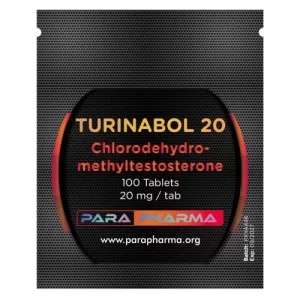 Click Here to Buy: Turinabol 20 by Para Pharma
Click Here to Buy: Turinabol 20 by Para Pharma
CJC-1295: A peptide that increases growth hormone and IGF-1 levels, aiding in fat loss, muscle gain, and improved sleep quality. It has a long half-life, making it convenient for users.
HGH Frag 176-191: A fragment of human growth hormone specifically designed for fat-burning. It targets adipose tissue without the broader effects of full-length HGH.
Tesamorelin: Known for reducing visceral fat, this peptide stimulates the release of growth hormone and is often used for weight management and metabolic health.
BPC-157: While primarily known for healing and recovery, BPC-157 can support fat loss indirectly by improving gut health and reducing inflammation.
Melanotan II: Originally developed for skin tanning, it also has appetite-suppressing properties, making it useful for weight management.
Thymosin Beta-4 (TB-500): Focused on healing and recovery, it can enhance physical performance and indirectly support fat loss through improved activity levels.
GHRP-6: A growth hormone-releasing peptide that boosts appetite and metabolism, aiding in muscle growth and fat loss.
Semaglutide: A GLP-1 receptor agonist that regulates appetite and blood sugar levels, making it effective for weight loss and metabolic health.
MK-677 (Ibutamoren): A growth hormone secretagogue that increases growth hormone and IGF-1 levels, promoting fat loss, muscle gain, and improved recovery.
List of Peptides With a Counteractive Effect Bodybuilders Must Avoid
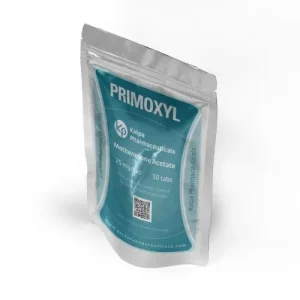 Click Here to Buy Primoxyl 25 by Kalpa Pharmaceuticals
Click Here to Buy Primoxyl 25 by Kalpa Pharmaceuticals
Some peptides can inadvertently lead to fat gain due to their effects on metabolism and appetite regulation. Here are a few that bodybuilders might want to avoid or use cautiously:
- GHRP-6 – While it stimulates growth hormone release, it also significantly increases appetite, which can lead to excess calorie consumption and fat gain.
- IGF-1 LR3 – This peptide enhances muscle growth but can also promote fat storage if not carefully managed with diet and training.
- MK-677 (Ibutamoren) – Though technically a growth hormone secretagogue rather than a peptide, it boosts GH levels but often leads to increased hunger and potential fat accumulation.
- CJC-1295 with DAC – While effective for muscle growth, its prolonged GH release can sometimes lead to unwanted fat retention if not paired with a strict diet
Overall
AOD-9604, derived from Growth Hormone, stimulates fat-burning by targeting lipolysis—the breakdown of fat for energy. It delivers these benefits without the additional effects of Growth Hormone, making it more cost-effective. For maximum effectiveness, it should be administered in a fasted state, ideally before bed and again in the morning at 125-250mcg doses. Pairing its use with fasting and fasted cardio can further enhance fat loss. Its sole focus is on improving the body’s ability to burn fat efficiently.
Read More: How Much Do You Know About B-AET? A Fat Burner You’ve Been Missing
Bodybuilding
Understanding Trenbolone-Induced Cough (“Tren Cough”)

Trenbolone, a potent anabolic steroid, can sometimes cause “tren cough”—a sudden and intense coughing episode shortly after injection. Although not exclusive to Trenbolone, it is more commonly associated with this substance due to its highly irritant nature.
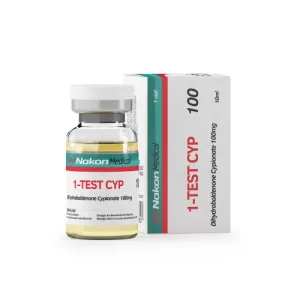 Click Here To Buy 1-Test Cyp 100 by Nakon Medical
Click Here To Buy 1-Test Cyp 100 by Nakon Medical
Mechanisms Behind Tren Cough
Solvent and Carrier Irritation
Trenbolone formulations often include volatile solvents like benzyl alcohol or benzyl benzoate, which may irritate lung tissues when absorbed quickly into systemic circulation.
Prostaglandin Release
Trenbolone promotes increased production of prostaglandins, particularly PGF2α. This compound triggers contraction in the smooth muscles of the lungs, leading to bronchoconstriction and coughing.
Micro-Oil Embolism
Tiny oil droplets from an injection can reach capillaries and travel to the lungs, causing mild embolic reactions that lead to temporary oxygen deprivation and coughing.
Histamine and Mast Cell Activation
For some individuals, Trenbolone triggers histamine release and mast cell activation, mimicking an allergic response and causing bronchospasms and cough reflexes.
Related Article: Best Syringes for Steroid Injection on Amazon
Using Salbutamol (Albuterol) to Manage Tren Cough
- Salbutamol, a widely-used β2-adrenergic receptor agonist, can alleviate tren cough symptoms by:
- Relaxing bronchial muscles, easing spasms that cause coughing.
- Inhibiting prostaglandin effects, reducing bronchoconstriction associated with PGF2α.
- Opening airways, preventing severe respiratory restrictions in susceptible individuals.
Application Methods
Inhaler (Optimal)
Take 1–2 puffs of salbutamol (100–200 mcg) 5–10 minutes before a Trenbolone injection. If coughing occurs afterward, additional puffs can swiftly resolve the issue.
Oral Tablets (Moderate)
Consuming 2–4 mg tablets 30–60 minutes before injection offers slower, longer-lasting relief but may be less effective than inhalation methods.
Nebulizer (Severe Cases)
For individuals with frequent episodes, nebulized doses of 2.5 mg salbutamol can provide substantial relief.
Preventive Measures to Reduce Tren Cough Risk
- Inject slowly to minimize systemic absorption and irritant effects.
- Split doses to lower reaction severity with smaller quantities.
- Opt for ventrogluteal injection sites, which have fewer blood vessels, reducing oil embolism risk.
- Choose lower-concentration solutions to lessen irritation, as higher concentrations (e.g., Tren Ace 200 mg/ml) are more likely to provoke reactions.
What Other Steroids Can Induce Coughing?
Here's a curated list of peptides, SARMs, and PEDs that may potentially cause coughing or respiratory irritation in bodybuilders and fitness enthusiasts:
Peptides
IGF-1 LR3 (Insulin-like Growth Factor): Known for its anabolic effects, IGF-1 LR3 can occasionally cause mild respiratory irritation due to systemic absorption.
TB-500 (Thymosin Beta-4): While rare, improper injection techniques or high doses may lead to transient coughing episodes.
GHRP-6 (Growth Hormone-Releasing Peptide): This peptide can stimulate histamine release, potentially leading to bronchospasms and coughing.
SARMs (Selective Androgen Receptor Modulators)
RAD-140: (Testolone) Some users report throat irritation or coughing, often attributed to solvents used in liquid formulations.
YK-11: Known for its myostatin-inhibiting properties, YK-11 may cause mild respiratory discomfort in sensitive individuals.
LGD-4033 (Ligandrol): Though uncommon, some users experience coughing due to carrier solvents or allergic-like reactions.
PEDs (Performance-Enhancing Drugs)
Boldenone Undecylenate (Equipoise): This injectable steroid can cause “Equipoise cough,” similar to tren cough, due to oil embolism or irritant solvents.
Testosterone Suspension: The water-based formulation may lead to coughing episodes if injected improperly or absorbed rapidly.
Nandrolone Decanoate (Deca-Durabolin): While less common, coughing can occur due to histamine release or systemic irritation.
More Tips to Minimize Coughing Risks
- Use proper injection techniques to avoid embolic reactions.
- Opt for lower-concentration solutions to reduce irritant effects.
- Consider antihistamines or bronchodilators for individuals prone to respiratory sensitivity.
Read More: Joint Stiffness: How to Manage It While on AAS
Are There Alternatives to Cough-inducing Steroids?
Here are some alternatives to cough-inducing steroids that can provide similar anabolic effects while minimizing respiratory irritation:
Peptides
IGF-1 LR3 (Insulin-like Growth Factor)
Promotes muscle growth and recovery without the irritant properties of certain steroids.
TB-500 (Thymosin Beta-4)
Enhances tissue repair and reduces inflammation, making it a safer option for recovery.
BPC-157 (Body Protection Compound)
Known for its healing properties, it supports muscle repair and joint health.
SARMs (Selective Androgen Receptor Modulators)
RAD-140 (Testolone)
Provides significant muscle-building effects with fewer systemic side effects compared to traditional steroids.
LGD-4033 (Ligandrol)
Boosts lean muscle mass and strength without the risk of respiratory irritation.
MK-677 (Ibutamoren)
Stimulates growth hormone release, aiding in muscle growth and recovery.
Natural Alternatives
Turkesterone
A plant-based ecdysteroid that supports muscle protein synthesis and recovery.
Ecdysterone
Another natural compound that mimics anabolic effects without the harsh side effects.
Creatine Monohydrate
Enhances strength and muscle mass through improved energy production during workouts.
Other Options
Human Growth Hormone (HGH)
Promotes muscle growth and fat loss, though it requires careful monitoring due to potential side effects.
Testosterone Boosters
Natural supplements like D-Aspartic Acid or Tribulus Terrestris can help optimize testosterone levels for muscle growth.
SARMs Alternatives
Legal and safer versions of SARMs are available, offering similar benefits without the risks associated with traditional SARMs.
Overall
We have explored the phenomenon of "tren cough," a sudden, intense coughing episode often caused by Trenbolone injections due to factors like solvent irritation, prostaglandin release, micro-oil embolism, or histamine activation. Preventive measures such as using salbutamol (via inhaler, oral tablets, or nebulizer), injecting slowly, splitting doses, and opting for lower-concentration solutions were highlighted.
Additionally, alternative compounds to tren cough-inducing steroids were discussed, including peptides like IGF-1 LR3 and TB-500, SARMs such as RAD-140 and LGD-4033, and natural options like Turkesterone, ecdysterone, and creatine. These alternatives provide anabolic effects while minimizing respiratory side effects. The conversation also underscored the importance of proper injection techniques and thoughtful compound selection to reduce risks.
-

 Steroids2 years ago
Steroids2 years agoShavers and Other Body Grooming Equipment for Bodybuilders In 2023
-

 Steroids2 years ago
Steroids2 years agoChatGPT and Other Avenues to Find Great Bodybuilding Coaches
-

 Steroids2 years ago
Steroids2 years agoBest Oil Recommendations Before Competition for Subtle Shimmer
-

 Steroids2 years ago
Steroids2 years agoPowerlifting Vs Power Building: Find Out the Big Difference and When to Shift Between the Two
-

 Nutrition2 years ago
Nutrition2 years agoEverything Nutritional Food: What’s Too Much Or Too Little
-

 Bodybuilding Products1 year ago
Bodybuilding Products1 year agoTelmisartan In Bodybuilding: An Expert’s Advice
-

 Bodybuilding8 months ago
Bodybuilding8 months agoPrimal Movements: Our Ultimate Guide for Maximum Results
-

 Anabolic Steroids1 year ago
Anabolic Steroids1 year agoLegality of Anabolic Steroids In Latin America
-

 Anabolic Steroids10 months ago
Anabolic Steroids10 months agoJoint Stiffness: How to Manage It While on AAS
-

 Bodybuilding1 year ago
Bodybuilding1 year agoChia Seeds in A Bodybuilder’s Diet: An Expert’s Advice
-
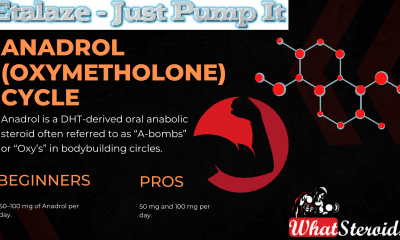
 Steroids1 year ago
Steroids1 year agoAnadrol Cycle: Benefits, Doses, Alternatives, etc.
-

 Beginners2 years ago
Beginners2 years agoTren Cycle for Beginners
-
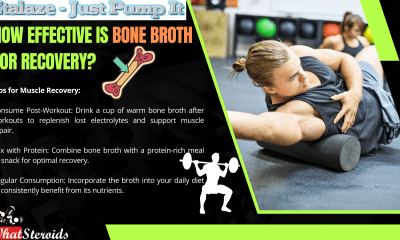
 Bodybuilding9 months ago
Bodybuilding9 months agoHow Effective is Bone Broth for Recovery?
-

 Steroids10 months ago
Steroids10 months agoOmnitope (Oxytocin)
-

 Bodybuilding1 year ago
Bodybuilding1 year agoHow Much Is Too Much Cardio? Understanding Heart Rate Zones
-
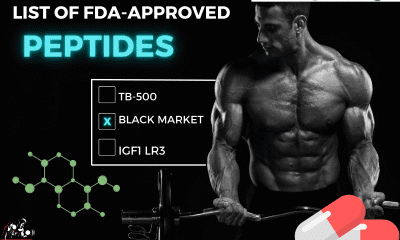
 Bodybuilding1 year ago
Bodybuilding1 year agoList of FDA-Approved Peptides
-

 Steroids9 months ago
Steroids9 months agoSleeping Positions for Effective Muscle Recovery
-

 Bodybuilding2 years ago
Bodybuilding2 years agoCompetition Prep Cycle for Pro Bodybuilders
-

 Bodybuilding1 year ago
Bodybuilding1 year agoCalorie Dumping: A Bodybuilder’s Guide
-

 Bodybuilding8 months ago
Bodybuilding8 months ago2nd Edition of Natural Bodybuilding Competition Facts
-
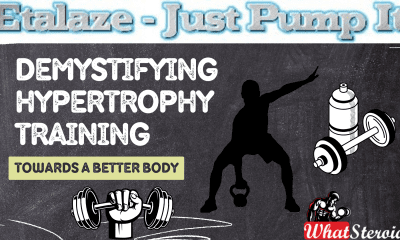
 Bodybuilding1 year ago
Bodybuilding1 year agoDemystifying Hypertrophy Training
-

 Bodybuilding9 months ago
Bodybuilding9 months agoAre Nootropics a Better Option to AAS?
-

 Anabolic Steroids12 months ago
Anabolic Steroids12 months agoHow Much Do You Know About B-AET? A Fat Burner You’ve Been Missing
-
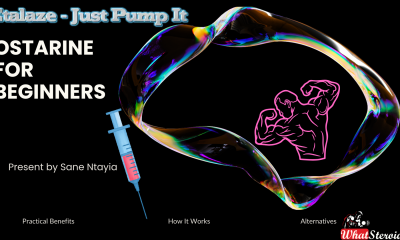
 Steroids4 months ago
Steroids4 months agoOstarine For Beginners: The Ultimate Guide
-

 Product Reviews12 months ago
Product Reviews12 months agoTop Vitamins for Skin Health


















